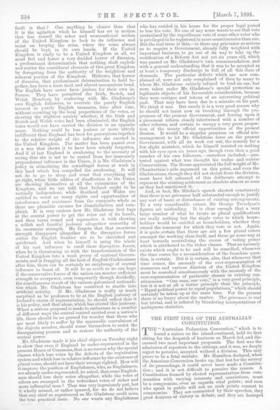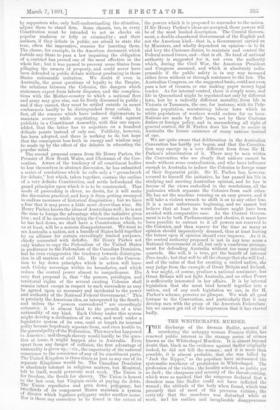THE FIRST IDEA OF THE AUSTRALIAN CONSTITUTION.
THE "Australian Federation Convention," which is to found a nation on the island-continent, held its first sitting for the despatch of business on March 3rd, and dis- cusssed two most important proposals. The first was the admission of reporters to the sittings, and it was, we deeply regret to perceive, accepted without a division. This may prove to be a fatal mistake. Mr. Hamilton declared, when the American Convention broke up, that but for the secrecy of its proceedings, it could never have made a Constitu- tion ; and it is not difficult to perceive the reason. A Constitution framed by elected representatives from com- munities with varying interests and convictions, must be a compromise, even as regards vital points ; and men who speak in public will not on such points consent to compromise. They are committed by their speeches, they grow desirous of victory in debate, and they are besieged by supporters who, only half-understanding the situation, adjure them to stand firm. Some clauses, too, in every Constitution must be intended to act as checks on popular madness or folly or criminality ; and their authors, if they debate in public, are afraid to state the true, often the imperative, reasons for inserting them. The clause, for example, in the American document which forbids any State to pass a law impairing the obligation of a contract has proved one of the most effective in the whole list ; but it was passed to prevent some States from pillaging the owners of property, and could never have been defended in public debate without producing in those States unbearable irritation. We doubt if even in Australia, the great questions of loyalty to the Empire, the relations between the Colonies, the dangers which statesmen expect from labour disputes, and the complica- tions with the Mother-country to which a national fleet and army may give rise, can be freely discussed in public ; and if they cannot, they must be settled outside in secret conferences hardly to be distinguished from cabals. In fact, all the reasons which have induced diplomatists to maintain secrecy while negotiating are valid against publicity in a Constituent Assembly, with this one super- added, that the latter has to negotiate on a hundred delicate points instead of only one. Publicity, however, has been adopted, and there is nothing to do but hope that the consequent loss both in energy and wisdom may be made up by the effect of the debates in educating the popular mind. The second proposal comes from Sir Henry Parkes, the Premier of New South Wales, and Chairman of the Con- vention. Aware of the tendency of all constituent bodies to lose themselves in abstract discussion, he has submitted a series of resolutions which he calls only a " groundwork for debate," but which, taken together, contain the outline of a very definite Constitution, and settle beforehand the grand principles upon which it is to be constructed. That mode of proceeding is clever, no doubt, for it will make the discussion practical, and keep it from getting swamped in endless morasses of historical disquisition ; but we have a fear that it may prove a little more clever than wise. Sir Henry Parkes knows the ideas of Australians well ; he is not the man to forego the advantage which the initiative gives bun ; and if he succeeds in tying the Convention to the lines he has laid down, we shall have a Constitution which, to us at least, will be a serious disappointment. We want to see Australia a nation, not a bundle of States held together by an alliance for certain exceedingly limited purposes, chiefly connected with defeerce. Sir Henry Parkes not only wishes to copy the Federalism of the United States in preference to the Federalism of the Canadian Dominion, but he even exaggerates the tendency towards disintegra- tion in all matters of civil life. He calls on the Conven- tion to lay down principles which in action will leave each Colony sovereign within its boundaries, and which reduce the central power almost to insignificance. His very first proposal is, that " the powers, privileges, and territorial rights of the several existing Colonies shall remain intact except in respect to such surrenders as may be agreed upon as necessary and incidental to the power and authority of the National Federal Government." This is precisely the American idea, as interpreted by the South ; and unless the "powers surrendered" are exceedingly extensive, it is almost fatal to the growth of a true nationality of any kind. Each Colony under this system might develop a civilisation of its own, and work under a legislative system of its own, until at length its internal polity became hopelessly separate from, and even hostile to, the general polity of the Federation. This was what happened in America ; an i and though slavery would hardly be the ques- tion at issue, t 'might happen also in Australia, Even apart from any danger of collision, the first advantage of nationality is given up,--viz., the superiority of the national conscience to the conscience of any of its constituent parts. The United Kingdom is three times as just as any one of its separate Kingdoms would be. The Canadian Dominion is absolutely tolerant in religious matters, but Montreal, left to itself, would persecute next week. The Union is for freedom, the South for slavery. The Union is houest to the last cent, but Virginia cavils at paying its debts. The Union repudiates and puts down polygamy, but two-thirds of its component States maintain a system of divorce which legalises polygamy under another name. Nor is there any corrective to be found in the extent of the powers which it is proposed to surrender to the nation, If Sir Henry Parkes's ideas are accepted, those powers will be of the most limited description. The Central Govern- ment, a double-chambered Government of the English and not the American kind—that is, a Government carried on by Ministers, and wholly dependent on opinion—is to fix and levy the Customs duties, to maintain and control the Federal armed forces, and—that is all. No kind of national authority is suggested for it, not even the authority which, during the Civil War, the American President and Congress assumed, and which is absolutely indis- pensable if the public safety is in any way menaced either from without or through resistance to the law, The Australian Congress, on the suggested basis, could not even pass a law of treason, or one making paper money legal tender. As for internal control, there is simply none, and life in Queensland might be regulated not only by different laws, but by a radically different morality, from life in Victoria or Tasmania, the one, for instance, with its Poly- nesian population, maintaining labour laws which ne white population of workers would endure for an hour. Nations are made by their laws, not by their Customs duties or foreign policy, and in surrendering all right of general control, Sir H. Parkes does his best to secure in Australia the future existence of many nations instead of one.
We are quite aware that deliberation in the Australian Convention has hardly yet begun, and that the Constitu- tion may emerge in a very different form from Sir H. Parkes's adumbration of it. There may be men within the Convention who see clearly that nations cannot be made without some centralisation, and who have influence enough in Australia to induce the Colonies to forego some of their Separatist pride. Sir H. Parkes has, however, secured to himself the initiative, he has passed his life in studying and meeting Australian opinion, and he has in favour of the views embodied in the resolutions, all the jealousies which separate the Colonies from each other. He has set the machine running on an easy groove, and it will take a, violent wrench to shift it on to any other line. It is a most unfortunate beginning, and we cannot but believe that at least its worst feature might have been avoided with comparative ease. As the Central Govern- ment is to be both Parliamentary and elective, it must have been possible to entrust to it all powers not reserved to the Colonies, and then reserve for the time as many as opinion should imperatively demand, thus at least leaving the future open if opinion should ever improve. As it is, the central authority proposed is not in any true sense a National Government at all, but only a cumbrous arrange- ment for defending Australia without too many internal quarrels. She will, it is true, get the benefit of internal Free-trade; but that will be all the change that she will feel ; and of the value of that for creating a united nation, she may judge from the example of Great Britain and Ireland. A war might, of course, produce a national sentiment; but Great Britain will not fight Australia, and no other Power is sufficiently interested in her affairs. It is by internal legislation that she must bind herself together into a nation, and of any such legislation we can, in Sir H. Parkes's scheme, perceive no glimpse. We wish all good fortune to the Convention, and particularly that it may develop men with the grasp of the American Federalists ; but we cannot get rid of the impression that it has started badly.







































 Previous page
Previous page